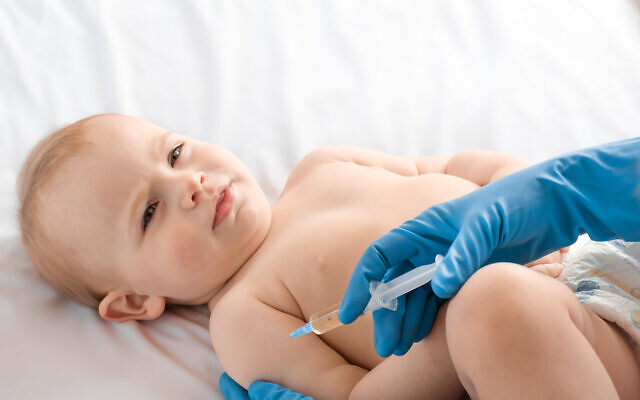Health Ministry rolls out plan to fight whooping cough outbreak
Following the death of a 10-week-old infant, another baby is admitted to Assuta Hospital in Ashdod, amid 12-fold surge in cases of the preventable disease in past six months
Renee Ghert-Zand is a reporter and feature writer for The Times of Israel.
The Health Ministry has formed a multipronged plan to put whooping cough (pertussis) vaccinations in the arms of as many unvaccinated children as possible following an outbreak in Jerusalem that has included the death of a 10-week-old baby and the recent hospitalization of a second infant in an intensive care unit.
An epidemiological study indicated that neither the baby who died nor its mother had been vaccinated against the infectious illness, whose popular name is based on the sound an afflicted person makes while severely coughing and trying to take in sufficient air.
Assuta Hospital in Ashdod announced Sunday that a four-month-old baby was brought in on June 14 after having been diagnosed with pertussis at a healthcare clinic. As the infant’s condition worsened — experiencing difficulty in breathing, low oxygen levels, and cyanosis (turning blue) — he was admitted to Assuta’s pediatric intensive care unit. Following treatment with antibiotics and non-invasive ventilation, his condition improved but he was still very sick.
One in five infants under two months with pertussis will require hospitalization on average, and one in 100 will die from complications of the disease caused by the highly infectious Bordetella pertussis bacteria. Treatment with antibiotics at the time of diagnosis does not significantly alter the course of the illness, hence the critical importance of preventative vaccination.
The Health Ministry’s plan involves identifying unvaccinated children, disseminating notices about the need to vaccinate, keeping well-baby clinics open for longer hours, and reaching unvaccinated children at their homes.
In a response to an inquiry from The Times of Israel, Health Ministry spokesperson Shira Solomon said that the staff of well-baby clinics is making extensive efforts to identify and reach families with unvaccinated or partially vaccinated children.
“We are inviting them to come urgently to get their regular vaccinations,” she said.
Due to the pressing circumstances, there is no need to call ahead.
“Unvaccinated babies aged six weeks and older can be brought into the clinics without appointments,” Solomon said.
Solomon also noted that clinic hours in Jerusalem, the epicenter of the whooping cough outbreak, may be extended if needed.
There have been more than two hundred cases of the serious and potentially fatal disease in the first half of this year, accounting for a 12-fold increase over the same period in 2022. Most of the cases have been in Haredi neighborhoods in Jerusalem, where living quarters are crowded and parents of large families do not always keep up with vaccination schedules for their many children.
Protection against pertussis is given as part of the DTap or Tdap combination vaccines, both of which protect against pertussis, tetanus and diphtheria. The vaccine schedule for infants and children involves six shots between the ages of 2 months and 13 years, given first in the well-baby clinics and later in school.
Solomon said that over the last few months, the Health Ministry has operated a “vaccination at home” service in Jerusalem and other areas around the country, whereby medical staff give shots in families’ homes. Families with three or more unvaccinated children can take advantage of this service.
A budget has also been approved to have a mobile vaccination unit circulating soon, including in Jerusalem.
The ministry is also urging pregnant women to get vaccinated against whooping cough. A pregnant woman’s vaccination protects her and her fetus until it is born and is old enough to be vaccinated.
“Healthcare providers should be reminding pregnant women about this,” Solomon noted.
The Israeli Midwives Association issued a statement, advising all pregnant women in weeks 27-36 to get a pertussis vaccination.
“It is critical to get the vaccine toward the end of the pregnancy to protect the baby as it exits the womb and enters this world. The protection is provided by the antibodies against whooping cough that pass through the placenta and protect the baby for the first four months of its life.”
“The vaccination is safe for both mother and baby,” the association emphasized.
A statement from Assuta indicated that the life-threatening situation faced by the baby admitted to the hospital last week could have been prevented had his mother been vaccinated.
“The younger a baby is, the higher the chance of death, and the damage caused to the heart and brain are irreversible,” said Noa Rosenfeld, head of Assuta’s pediatric ICU.
Although childhood pertussis vaccinations end at age 13, the Health Ministry advises adults to receive a pertussis booster shot after the age of 18 to maintain protection. This is especially critical for medical school students and those who work in healthcare settings.










